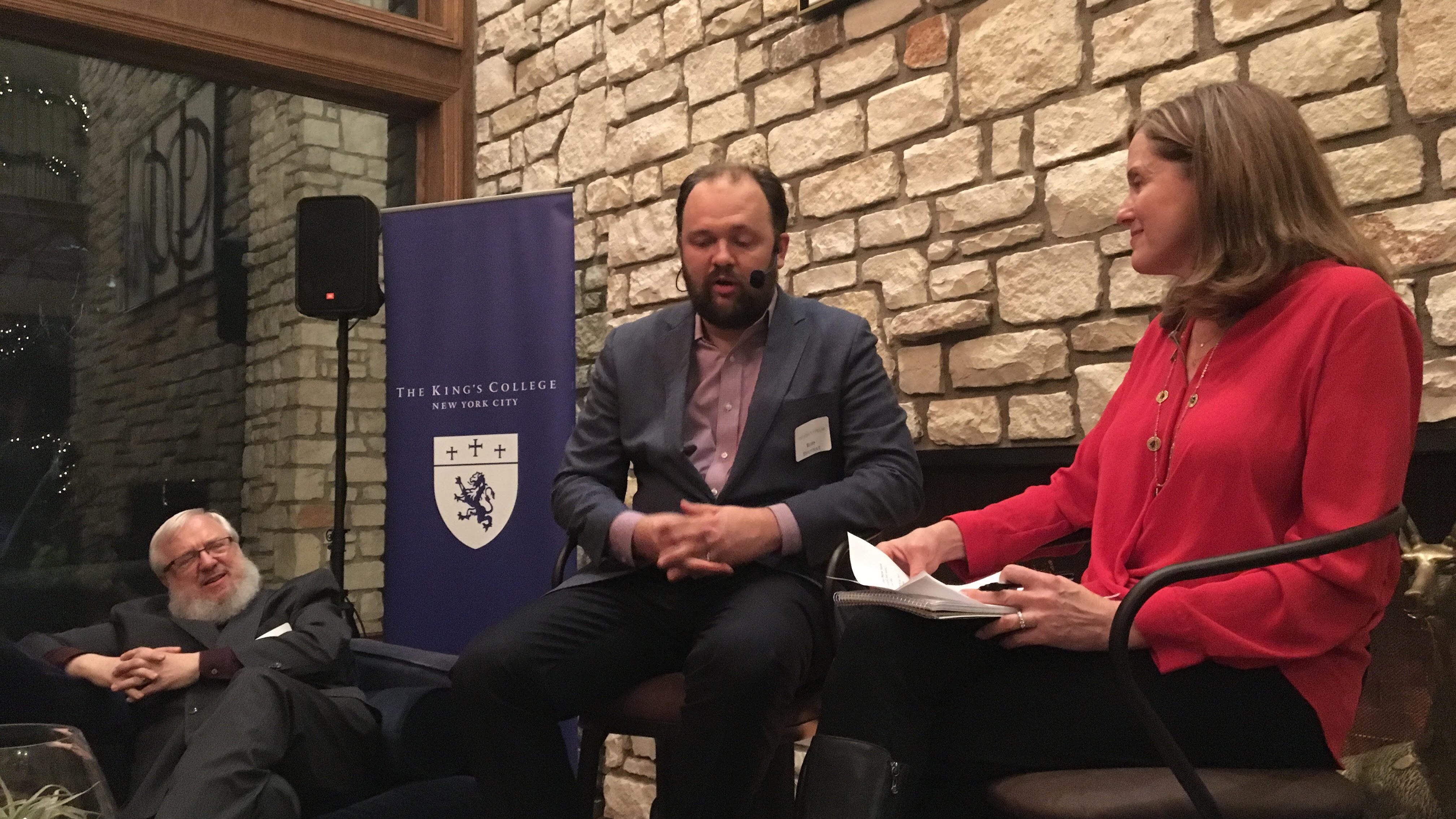King’s Forum Event Addresses State of Religion in America
In an interview with Peggy Wehmeyer, New York Times columnist Ross Douthat discussed the challenges of unifying polarized people under one spiritual philosophy.

The King’s Forum, a series of conversations about spiritual and political topics inaugurated earlier this year, held a second event in Dallas on December 13. Senior Fellow Todd von Helms introduced award-winning journalist Peggy Wehmeyer and New York Times op-ed columnist Ross Douthat, who discussed the state of religion in America and the challenges of unifying polarized people under one spiritual philosophy.
Wehmeyer interviewed Douthat about his reception as a conservative religious writer for The New York Times. Douthat described himself as an “affirmative action hire” who was hired not for his excellent writing but because the Times wanted to contract a pro-life writer interested in religion. The liberal media often depicts Christians poorly, Douthat explained, not out of a persecution agenda but out of ignorance. Since the media reports largely on conflict, religion in the news is often depicted unflatteringly. By hiring Douthat, the Times sought to broaden its scope and understanding of religion.
Writing for the Times is a “high-stress gift,” Douthat said. “I write for people who disagree with me. Not always, and not on every issue,” but “a lot of the time I get misunderstood. Every six months or so there’s an Internet freak-out over one of my columns.” Most recently, his tribute to the late George. H.W. Bush earned a great deal of ire from his online audience. “But that’s part of the job,” Douthat said.
Douthat sees his position at the Times as an opportunity to help reunify 300 million Americans under a public philosophy with a robust Christian foundation. Modern American religion consists of three disparate categories, Douthat proposed: the non-religion of the “nones” who view religion as socially useful but not supernaturally legitimate; the traditional (or Biblical) worldview that regards Scripture as the source of divine truth; and the American religious center, an indistinct, feel-good derivation of Protestantism championed by Joel Osteen and Oprah Winfrey.
Over the last 20 years, Douthat noted, America has not become dramatically secularized, but Americans identify less and less with institutional religion. While the traditional Biblical population is resilient and maintains membership over time, Americans overall are becoming less communal and more isolated. In the midst of rising loneliness, addiction, and suicide, Douthat said that “Traditionalist churches are here as missionaries to a socially collapsing world.”
“How do you re-conceptualize the American religious center so it’s not just prosperity theology and therapeutic religion?” Douthat asked. Religious people and Christians have a particular role in restoring robust, moral religion in the American narrative because “America’s not going to stop being a religious country, so it matters what kind of religious center we ultimately settle on. A small ‘o’ orthodox Christianity offers a plausible center.”
By broaching contemporary cultural issues and historical conflicts with sensitivity and truthfulness, Douthat suggests that Christians can reintroduce faith to the American narrative that has become disparate and contested since the Cold War. Right now, as a country, America does not have a story, and President Trump is not offering a unifying story. Douthat said, “You do need the story. It’s everyone’s task but it’s ultimately the task of people who write and think for a living, for better or for worse.”
Before President Tim Gibson closed the evening in prayer, von Helms told the audience, “We believe that serious learning is an offering to the Lord, and when you think about the Scriptures that talk about loving the Lord with all of our heart, mind, soul, and strength, oftentimes we’re neglecting the mind.” At The King’s College and The King’s Forum, “We will wrestle through these difficult things together.”
The King’s College plans to hold additional King’s Forum events in Dallas in the future.




